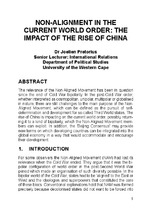| dc.contributor.author | Pretorius, Joelien | |
| dc.date.accessioned | 2012-11-23T14:16:16Z | |
| dc.date.available | 2012-11-23T14:16:16Z | |
| dc.date.issued | 2008 | |
| dc.identifier.citation | Pretorius, J. (2008). Non-alignment in the current world order. The impact of the rise of China. Strategic Review for Southern Africa, 30(1): 1-27 | en_US |
| dc.identifier.issn | 1013-1108 | |
| dc.identifier.uri | http://hdl.handle.net/10566/472 | |
| dc.description.abstract | The relevance of the Non-Aligned Movement has been in question since the end of Cold War bipolarity. In the post-Cold War order, whether interpreted as cosmopolitan, unipolar, multipolar or globalised in nature, there are still challenges to the main purpose of the Non-Aligned Movement, which can be defined as the pursuit of self-determination and development for so-called Third World states. The rise of China is impacting on the current world order, possibly returning it to a kind of bipolarity, which the Non-Aligned Movement members can exploit. In addition, the 'Beijing Consensus' may provide new terms on which developing countries can be integrated into the global economy in a way that would accommodate and encourage their development. | en_US |
| dc.language.iso | en | en_US |
| dc.publisher | Institute for Strategic Studies at the University of Pretoria | en_US |
| dc.rights | Copyright Institute for Strategic Studies, University of Pretoria. Permission granted for this file to be in the Repository. | |
| dc.subject | China | en_US |
| dc.subject | Non-aligned movement | en_US |
| dc.title | Non-alignment in the current world order. The impact of the rise of China | en_US |
| dc.type | Article | en_US |
| dc.privacy.showsubmitter | false | |
| dc.status.ispeerreviewed | true | |
| dc.description.accreditation | Web of Science | en_US |

